人教版(2019)必修 第二册Unit 4 History and traditions Discovering Useful Structures & Listening and Talking课件
文档属性
| 名称 | 人教版(2019)必修 第二册Unit 4 History and traditions Discovering Useful Structures & Listening and Talking课件 |  | |
| 格式 | pptx | ||
| 文件大小 | 3.1MB | ||
| 资源类型 | 教案 | ||
| 版本资源 | 人教版(2019) | ||
| 科目 | 英语 | ||
| 更新时间 | 2023-11-05 10:23:04 | ||
图片预览

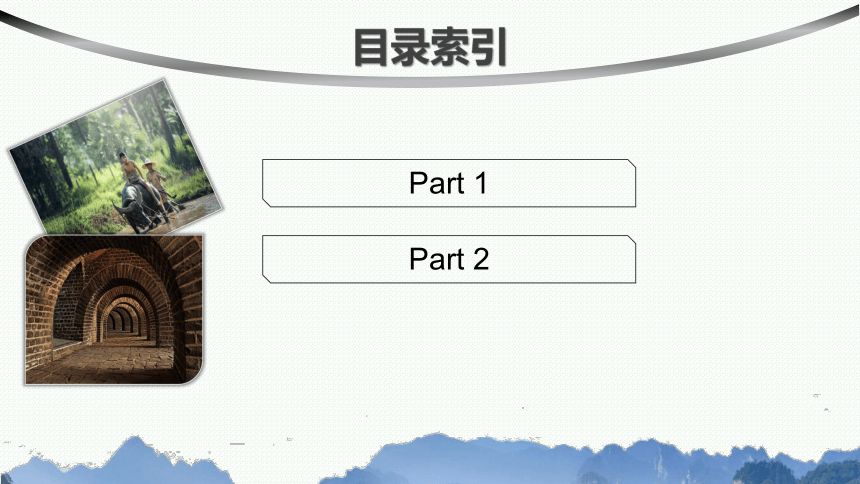
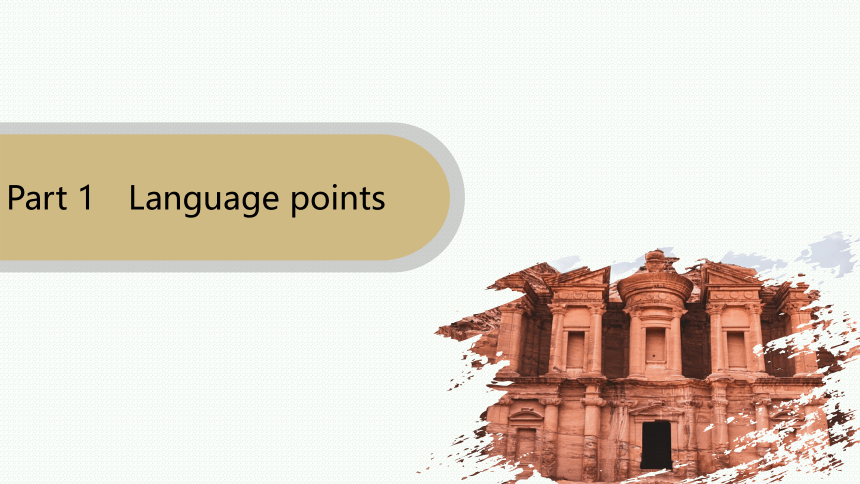
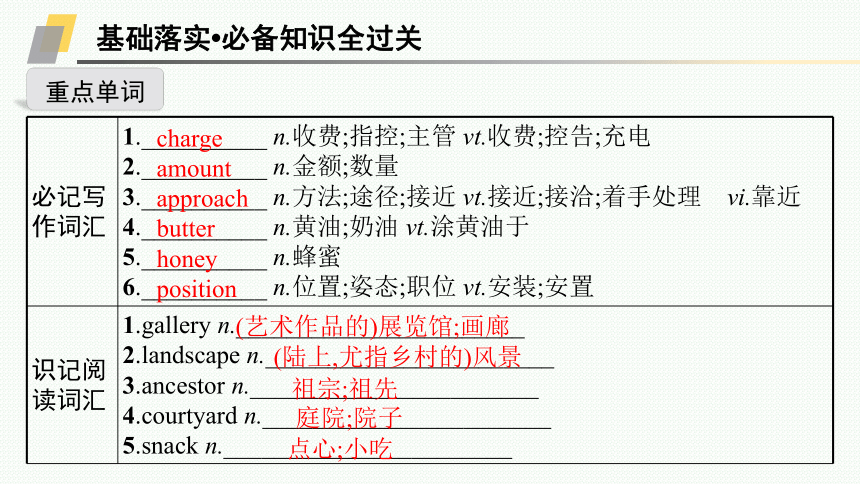
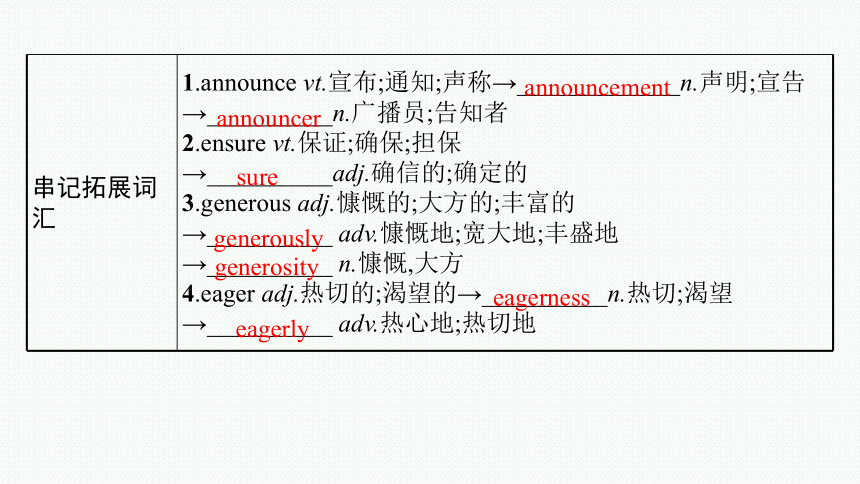
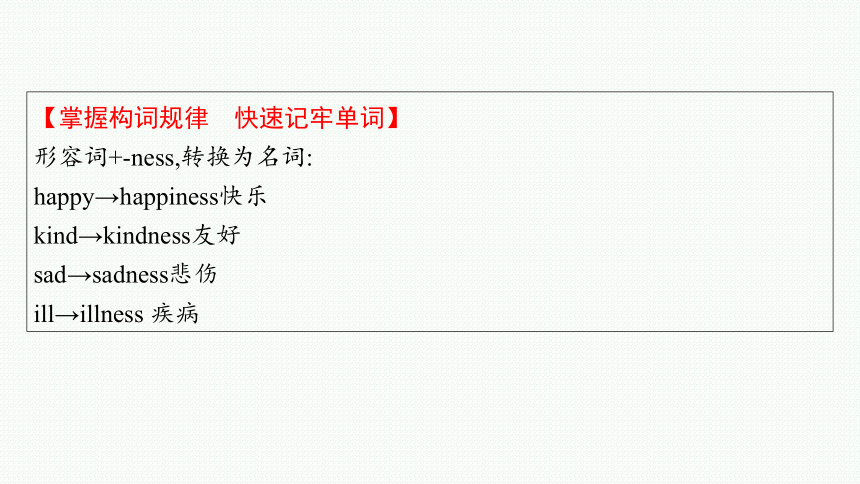
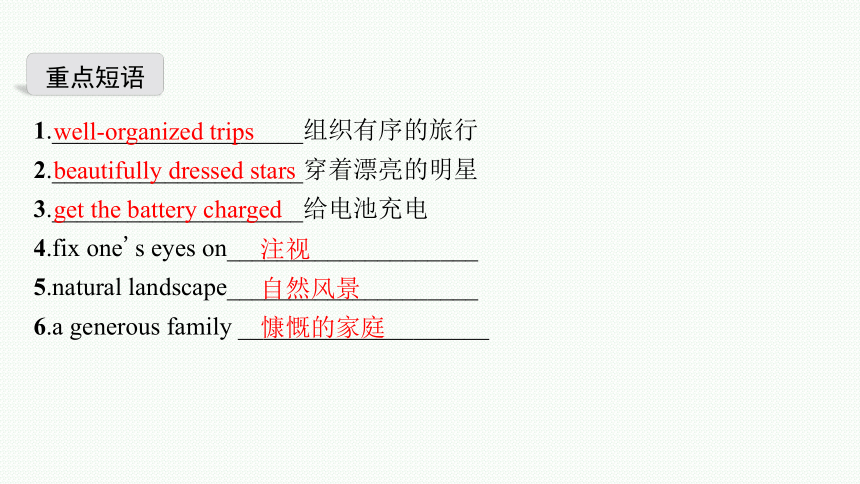
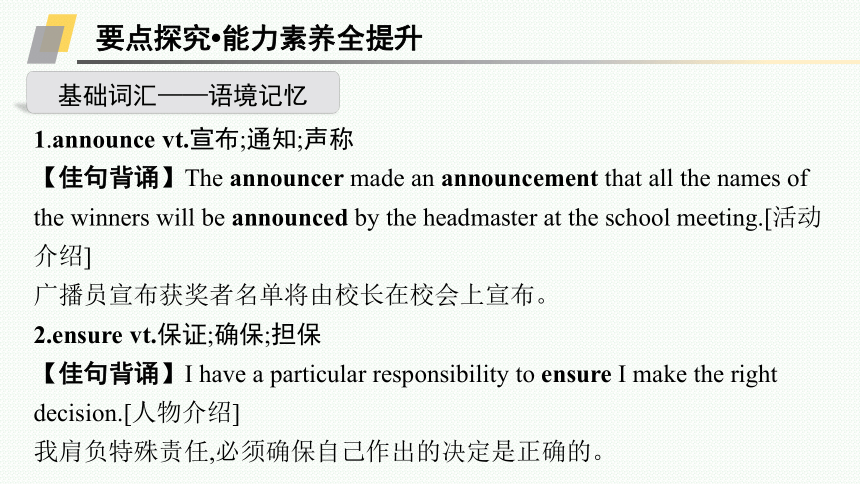
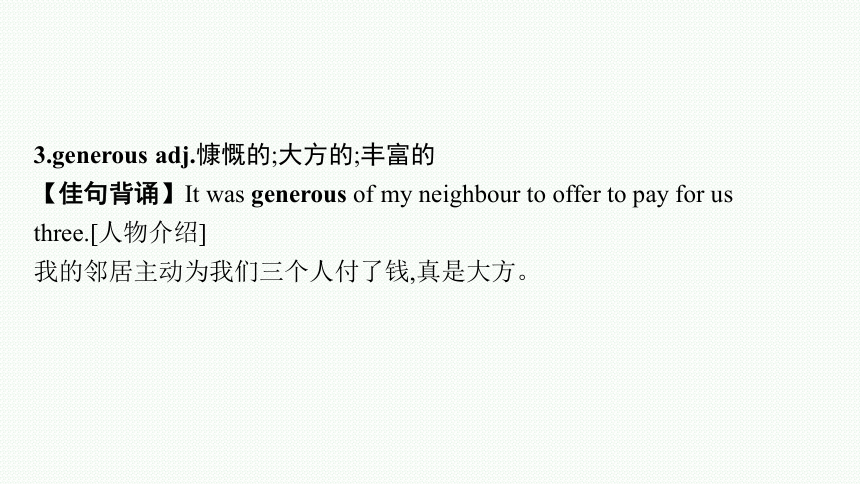
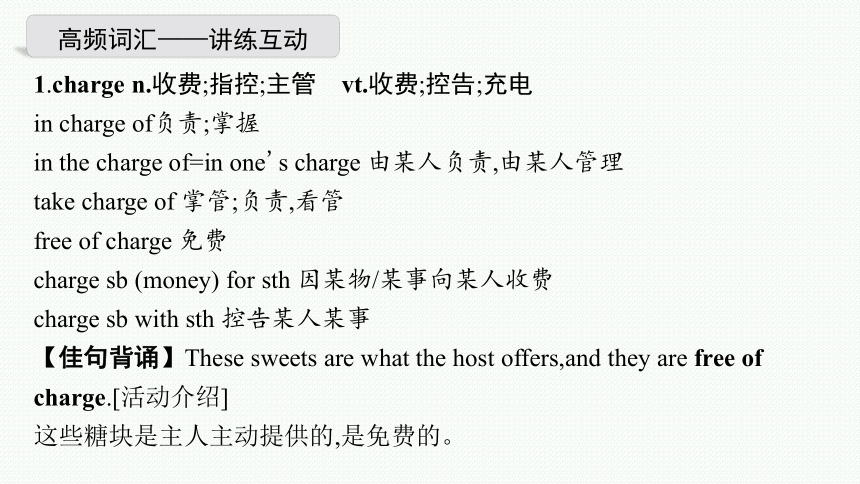
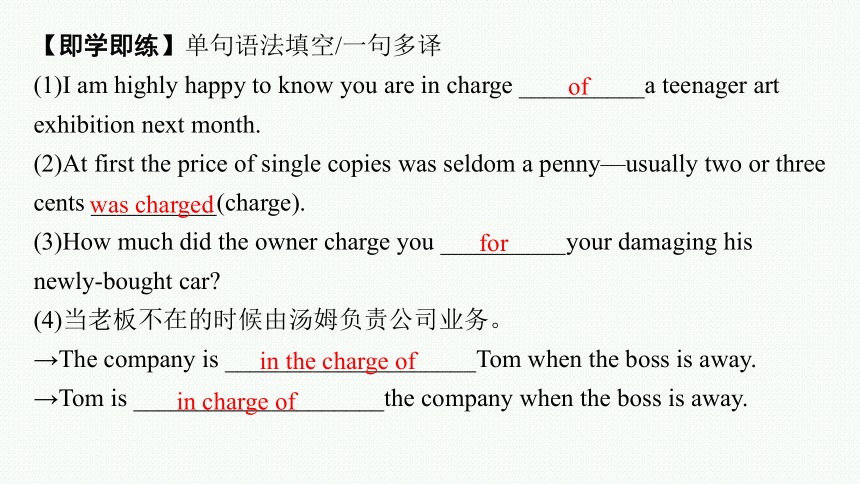
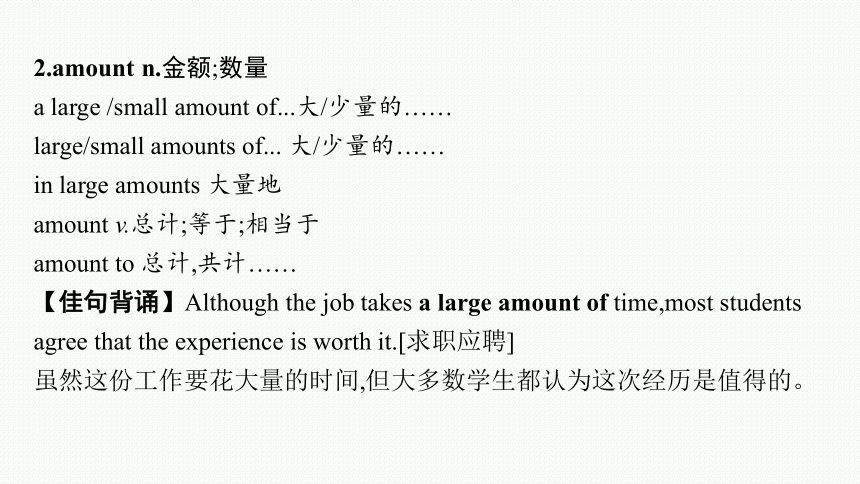
文档简介
(共33张PPT)
UNIT 4 HISTORY AND TRADITIONS
Section C Discovering Useful Structures & Listening and Talking
Part 1
Part 2
目录索引
Part 1 Language points
基础落实 必备知识全过关
重点单词
必记写作词汇 1.__________ n.收费;指控;主管 vt.收费;控告;充电
2.__________ n.金额;数量
3.__________ n.方法;途径;接近 vt.接近;接洽;着手处理 vi.靠近
4.__________ n.黄油;奶油 vt.涂黄油于
5.__________ n.蜂蜜
6.__________ n.位置;姿态;职位 vt.安装;安置
识记阅读词汇 1.gallery n._______________________
2.landscape n._______________________
3.ancestor n._______________________
4.courtyard n._______________________
5.snack n._______________________
charge
amount
approach
butter
honey
position
(艺术作品的)展览馆;画廊
(陆上,尤指乡村的)风景
祖宗;祖先
庭院;院子
点心;小吃
串记拓展词汇 1.announce vt.宣布;通知;声称→_____________n.声明;宣告
→__________n.广播员;告知者
2.ensure vt.保证;确保;担保
→__________adj.确信的;确定的
3.generous adj.慷慨的;大方的;丰富的
→__________ adv.慷慨地;宽大地;丰盛地
→__________ n.慷慨,大方
4.eager adj.热切的;渴望的→__________n.热切;渴望→__________ adv.热心地;热切地
announcement
announcer
sure
generously
generosity
eagerness
eagerly
【掌握构词规律 快速记牢单词】
形容词+-ness,转换为名词:
happy→happiness快乐
kind→kindness友好
sad→sadness悲伤
ill→illness 疾病
重点短语
1.____________________组织有序的旅行
2.____________________穿着漂亮的明星
3.____________________给电池充电
4.fix one's eyes on____________________
5.natural landscape____________________
6.a generous family ____________________
well-organized trips
beautifully dressed stars
get the battery charged
注视
自然风景
慷慨的家庭
要点探究 能力素养全提升
基础词汇——语境记忆
1.announce vt.宣布;通知;声称
【佳句背诵】The announcer made an announcement that all the names of the winners will be announced by the headmaster at the school meeting.[活动介绍]
广播员宣布获奖者名单将由校长在校会上宣布。
2.ensure vt.保证;确保;担保
【佳句背诵】I have a particular responsibility to ensure I make the right decision.[人物介绍]
我肩负特殊责任,必须确保自己作出的决定是正确的。
3.generous adj.慷慨的;大方的;丰富的
【佳句背诵】It was generous of my neighbour to offer to pay for us three.[人物介绍]
我的邻居主动为我们三个人付了钱,真是大方。
高频词汇——讲练互动
1.charge n.收费;指控;主管 vt.收费;控告;充电
in charge of负责;掌握
in the charge of=in one's charge 由某人负责,由某人管理
take charge of 掌管;负责,看管
free of charge 免费
charge sb (money) for sth 因某物/某事向某人收费
charge sb with sth 控告某人某事
【佳句背诵】These sweets are what the host offers,and they are free of charge.[活动介绍]
这些糖块是主人主动提供的,是免费的。
【即学即练】单句语法填空/一句多译
(1)I am highly happy to know you are in charge __________a teenager art exhibition next month.
(2)At first the price of single copies was seldom a penny—usually two or three cents __________(charge).
(3)How much did the owner charge you __________your damaging his newly-bought car
(4)当老板不在的时候由汤姆负责公司业务。
→The company is ____________________Tom when the boss is away.
→Tom is ____________________the company when the boss is away.
of
was charged
for
in the charge of
in charge of
2.amount n.金额;数量
a large /small amount of...大/少量的……
large/small amounts of... 大/少量的……
in large amounts 大量地
amount v.总计;等于;相当于
amount to 总计,共计……
【佳句背诵】Although the job takes a large amount of time,most students agree that the experience is worth it.[求职应聘]
虽然这份工作要花大量的时间,但大多数学生都认为这次经历是值得的。
【即学即练】单句语法填空/单句写作
(1)A lot of cities got __________large amount of money from tourism in spite of the epidemic prevention.
(2)A large amount of money __________(be) to be spent in building a new bridge for the village.
(3)Large amounts of land in the area __________(have) been reserved for national parks these years.
(4)该发言人强调这些措施并不等同于全面禁止。
The spokesman stressed that the measures did not _________ _________ an overall ban.
【名师点津】“a huge amount of+不可数名词”作主语时,谓语动词用单数形式;“huge amounts of+不可数名词”作主语时,谓语动词用复数形式。
a
is
have
amount to
3.approach n.方法;途径;接近 vt.接近;接洽;着手处理 vi.靠近
approach sb/sth 靠近/接近某人/某物
(an) approach to (doing) sth 接近,近似;(做)某事的方法(途径)
with...approaching在某事/物快到的时候
at the approach of在……快到的时候
【佳句背诵】As Teachers' Day is approaching,our class has decided to hold a party to celebrate the important day.[活动安排]
随着教师节的临近,我们班已决定举行一场聚会来庆祝这个重要的日子。
【即学即练】单句语法填空/句式升级
(1)All the approaches __________the airport were blocked by the heavy snow which had lasted for two days.
(2)Facing up to your problems rather than running away from them is the best approach to __________(work) things out.
(3)As the Spring Festival is approaching,some students are getting more and more excited.
→______________________________________________,some students are getting more and more excited.(升级为with的复合结构)
【名师点津】approach 作名词,后面常跟介词to表示“……的方法”,而way,method,means表示“方法”时后常跟介词of。
to
working
With the Spring Festival approaching
4.eager adj.热切的;渴望的
be eager for...渴望……
be eager to do sth 渴望做某事
eagerly adv.急切地;渴望地;热心地
eagerness n.渴望;热心
【佳句背诵】 I am eager for the job to be offered by your company and I am sure that I will satisfy all your requirements.[求职应聘]
我渴望你们公司提供的这个工作,我确信我会满足你们所有的要求。
【即学即练】单句语法填空/单句写作
(1)Jules was not eager __________classroom learning;he hungered for adventure.
(2)We are all eager __________(live) a normal life without the virus influencing us.
(3)Here I am __________(eager) writing to you for help to give me some approaches to learning English better.
(4)他们渴望尽快熟悉环境,以便更好地适应自己在中国的工作。
They ________ ________ ________ ________ ________ ________ the environment so that they will adapt to their work in China as soon as possible.
for
to live
eagerly
are eager to be familiar with
重点句式——多维剖析
which引导非限制性定语从句
【教材原句】They watched over the lake with their cameras and binoculars, which were positioned on the hill.
他们用相机和望远镜来观察这湖,这些东西被固定在山上。
使用“which引导非限制性定语从句”时应注意几点:
(1)which可以指代前面的名词,也可以指代前面的句子。
(2)which从句前应使用逗号和主句隔开。
(3)引导非限制性定语从句的关系代词还有:who,whom和whose。
(4)引导非限制性定语从句的关系副词有:when,where,why等。
【佳句背诵】Beijing,which is the capital of China,is especially beautiful in autumn.[地点介绍]
北京,中国的首都,在秋天时特别美丽。
【即学即练】单句语法填空/单句写作
(1)My little brother said he had finished all of his homework,__________ I doubted very much.
(2)I earn only 2,000 yuan a month,half of __________is spent on my car and the house loan.
(3)Yesterday,my boss left for Paris,__________ he had stayed for five years.
(4)My connection with pandas goes back to my days on a TV show in the mid-1980s,__________ I was the first TV western reporter.
(5)Some people think that the great Chinese scholar Confucius,__________ lived from roughly 551 BCE to 479 BCE,influenced the development of chopsticks.
which
which
where
when
who
(6)上周,这孩子每晚都发烧,这使他的父母非常着急。
Last week,the child had a fever every night, ________ ________ ________ ________ very much.
which worried his
parents
Part 2 Grammar
语法冲关 语言规则全理清
过去分词作定语和宾语补足语
情景导入
(1)Last week,I served as a volunteer at a competition held by the Student Union to have my communication skills improved.(2)The judges invited were from Grade Three.(3)All students interested were allowed to attend the competition.(4)With all preparation work done,the competition went on smoothly.(5)At last,the competition was very successful,and we were all happy to see our efforts recognised by students and teachers.
【语法感悟】
1.过去分词在句子中作__________,修饰前面的名词,表示被动或完成,比如句__________、句__________和句__________。
2.句__________和句__________中分别是with复合结构和see sth done结构,过去分词作__________。
后置定语
(1)
(2)
(3)
(4)
(5)
宾语补足语
语法精讲
一、过去分词作定语
过去分词是非谓语动词的一种形式,它既保留了动词的某些特征,又具有形容词和副词的特征。
1.过去分词作定语时的位置
单个过去分词作定语一般置于被修饰的词语之前,过去分词短语作定语时一般置于被修饰的词语之后。
To her the outside world was a totally unknown quantity.
对她来说,外部世界完全是个未知数。
Who were the so-called guests invited to your party last night
昨晚被邀请参加你的聚会的那些所谓的客人是谁呀
Things bought through computers are much cheaper.
通过电脑购买的物品要便宜得多。
2.过去分词作定语时的功能
过去分词作定语时,其功能相当于一个定语从句,因此可以改为相应的定语从句。
The injured workers are now being taken good care of in the hospital.
= The workers who were injured are now being taken good care of in the hospital.
受伤的工人现正在医院受到良好的照料。
3.过去分词作定语时的意义
一般来说,及物动词的过去分词作定语,表示一个被动的、已完成的动作;不及物动词的过去分词作定语不含有被动意义,只表示该动作已完成。
The damaged car is being repaired in the garage.
被损坏的车正在修理厂维修。
This is a book written by the famous film star.
这是那个著名的电影明星写的书。
When there is a wind,the fallen leaves are swept up into the sky.
有风时,落叶被刮到天空中。
Tom's grandfather is a retired engineer.
汤姆的爷爷是位退休工程师。
【即学即练】单句语法填空
(1)The local government decided to rebuild the __________(damage) bridge.
(2)That old woman was drinking __________(boil) water,enjoying the __________(fall) leaves on the ground.
(3)The air and water __________(pollute) by the city's chemical plant are harmful to people's health.
damaged
boiled
fallen
polluted
二、过去分词作宾语补足语
1.特征及含义
(1)及物动词的过去分词作宾语补足语与宾语有逻辑上的动宾关系,表示被动意义或已完成意义,有时候两者兼而有之。
Back from his two-year medical service in Africa,Dr Lee was very happy to see his mother taken good care of at home.
李博士在非洲进行了两年的医疗服务,回来后看到他的母亲在家里被照顾得很好,他很高兴。
(2)不及物动词用作宾语补足语时,与宾语没有逻辑上的动宾关系,只表示动作的完成或状态。
They found all the guests gone when they woke up.
当他们醒来时,发现所有的客人都走了。
2.使用过去分词作宾语补足语的几种情况
(1)在感官动词watch,notice,see,hear,listen to,feel,find,observe等后。
He found his hometown greatly changed.
他发现他的家乡变化很大。
Mr Brown saw the walls painted white when he came back.
布朗先生回来后发现墙被刷成了白色。
(2)在表示“致使”的动词如get,keep,leave,have,make等后。
We must try our best to get the work finished before Friday.
我们必须尽力在周五前完成工作。
Please keep me informed if anything happens.
如果发生任何事情请通知我。
The speaker raised his voice in order to make himself heard.
为了让自己被听到,演讲者提高了声音。
(3)在表示爱憎、意愿的动词如want,wish,like,hate等后。
Would you like it wrapped in brown paper,sir,or in white
先生,你喜欢把它用棕色的还是白色的纸包上
I'd like the house decorated with coloured lights.
我想让房子装饰上彩灯。
(4)用在with结构中,该结构通常在句中作时间、方式、条件、原因等状语。
With the problem settled,the manager went home happily.
事情得到解决,经理高高兴兴地回家了。
She stood in front of him,with her eyes fixed on his face.
她站在他面前,眼睛注视着他的脸。
【即学即练】单句语法填空
(1)When I opened the door,I found the ground __________(cover) with heavy snow.
(2)When I went into the living room,I saw a strange girl __________(seat) in the corner.
(3)The road was seen __________(block) by masses of huge stones,so we had to choose another route.
covered
seated
blocked
本 课 结 束
UNIT 4 HISTORY AND TRADITIONS
Section C Discovering Useful Structures & Listening and Talking
Part 1
Part 2
目录索引
Part 1 Language points
基础落实 必备知识全过关
重点单词
必记写作词汇 1.__________ n.收费;指控;主管 vt.收费;控告;充电
2.__________ n.金额;数量
3.__________ n.方法;途径;接近 vt.接近;接洽;着手处理 vi.靠近
4.__________ n.黄油;奶油 vt.涂黄油于
5.__________ n.蜂蜜
6.__________ n.位置;姿态;职位 vt.安装;安置
识记阅读词汇 1.gallery n._______________________
2.landscape n._______________________
3.ancestor n._______________________
4.courtyard n._______________________
5.snack n._______________________
charge
amount
approach
butter
honey
position
(艺术作品的)展览馆;画廊
(陆上,尤指乡村的)风景
祖宗;祖先
庭院;院子
点心;小吃
串记拓展词汇 1.announce vt.宣布;通知;声称→_____________n.声明;宣告
→__________n.广播员;告知者
2.ensure vt.保证;确保;担保
→__________adj.确信的;确定的
3.generous adj.慷慨的;大方的;丰富的
→__________ adv.慷慨地;宽大地;丰盛地
→__________ n.慷慨,大方
4.eager adj.热切的;渴望的→__________n.热切;渴望→__________ adv.热心地;热切地
announcement
announcer
sure
generously
generosity
eagerness
eagerly
【掌握构词规律 快速记牢单词】
形容词+-ness,转换为名词:
happy→happiness快乐
kind→kindness友好
sad→sadness悲伤
ill→illness 疾病
重点短语
1.____________________组织有序的旅行
2.____________________穿着漂亮的明星
3.____________________给电池充电
4.fix one's eyes on____________________
5.natural landscape____________________
6.a generous family ____________________
well-organized trips
beautifully dressed stars
get the battery charged
注视
自然风景
慷慨的家庭
要点探究 能力素养全提升
基础词汇——语境记忆
1.announce vt.宣布;通知;声称
【佳句背诵】The announcer made an announcement that all the names of the winners will be announced by the headmaster at the school meeting.[活动介绍]
广播员宣布获奖者名单将由校长在校会上宣布。
2.ensure vt.保证;确保;担保
【佳句背诵】I have a particular responsibility to ensure I make the right decision.[人物介绍]
我肩负特殊责任,必须确保自己作出的决定是正确的。
3.generous adj.慷慨的;大方的;丰富的
【佳句背诵】It was generous of my neighbour to offer to pay for us three.[人物介绍]
我的邻居主动为我们三个人付了钱,真是大方。
高频词汇——讲练互动
1.charge n.收费;指控;主管 vt.收费;控告;充电
in charge of负责;掌握
in the charge of=in one's charge 由某人负责,由某人管理
take charge of 掌管;负责,看管
free of charge 免费
charge sb (money) for sth 因某物/某事向某人收费
charge sb with sth 控告某人某事
【佳句背诵】These sweets are what the host offers,and they are free of charge.[活动介绍]
这些糖块是主人主动提供的,是免费的。
【即学即练】单句语法填空/一句多译
(1)I am highly happy to know you are in charge __________a teenager art exhibition next month.
(2)At first the price of single copies was seldom a penny—usually two or three cents __________(charge).
(3)How much did the owner charge you __________your damaging his newly-bought car
(4)当老板不在的时候由汤姆负责公司业务。
→The company is ____________________Tom when the boss is away.
→Tom is ____________________the company when the boss is away.
of
was charged
for
in the charge of
in charge of
2.amount n.金额;数量
a large /small amount of...大/少量的……
large/small amounts of... 大/少量的……
in large amounts 大量地
amount v.总计;等于;相当于
amount to 总计,共计……
【佳句背诵】Although the job takes a large amount of time,most students agree that the experience is worth it.[求职应聘]
虽然这份工作要花大量的时间,但大多数学生都认为这次经历是值得的。
【即学即练】单句语法填空/单句写作
(1)A lot of cities got __________large amount of money from tourism in spite of the epidemic prevention.
(2)A large amount of money __________(be) to be spent in building a new bridge for the village.
(3)Large amounts of land in the area __________(have) been reserved for national parks these years.
(4)该发言人强调这些措施并不等同于全面禁止。
The spokesman stressed that the measures did not _________ _________ an overall ban.
【名师点津】“a huge amount of+不可数名词”作主语时,谓语动词用单数形式;“huge amounts of+不可数名词”作主语时,谓语动词用复数形式。
a
is
have
amount to
3.approach n.方法;途径;接近 vt.接近;接洽;着手处理 vi.靠近
approach sb/sth 靠近/接近某人/某物
(an) approach to (doing) sth 接近,近似;(做)某事的方法(途径)
with...approaching在某事/物快到的时候
at the approach of在……快到的时候
【佳句背诵】As Teachers' Day is approaching,our class has decided to hold a party to celebrate the important day.[活动安排]
随着教师节的临近,我们班已决定举行一场聚会来庆祝这个重要的日子。
【即学即练】单句语法填空/句式升级
(1)All the approaches __________the airport were blocked by the heavy snow which had lasted for two days.
(2)Facing up to your problems rather than running away from them is the best approach to __________(work) things out.
(3)As the Spring Festival is approaching,some students are getting more and more excited.
→______________________________________________,some students are getting more and more excited.(升级为with的复合结构)
【名师点津】approach 作名词,后面常跟介词to表示“……的方法”,而way,method,means表示“方法”时后常跟介词of。
to
working
With the Spring Festival approaching
4.eager adj.热切的;渴望的
be eager for...渴望……
be eager to do sth 渴望做某事
eagerly adv.急切地;渴望地;热心地
eagerness n.渴望;热心
【佳句背诵】 I am eager for the job to be offered by your company and I am sure that I will satisfy all your requirements.[求职应聘]
我渴望你们公司提供的这个工作,我确信我会满足你们所有的要求。
【即学即练】单句语法填空/单句写作
(1)Jules was not eager __________classroom learning;he hungered for adventure.
(2)We are all eager __________(live) a normal life without the virus influencing us.
(3)Here I am __________(eager) writing to you for help to give me some approaches to learning English better.
(4)他们渴望尽快熟悉环境,以便更好地适应自己在中国的工作。
They ________ ________ ________ ________ ________ ________ the environment so that they will adapt to their work in China as soon as possible.
for
to live
eagerly
are eager to be familiar with
重点句式——多维剖析
which引导非限制性定语从句
【教材原句】They watched over the lake with their cameras and binoculars, which were positioned on the hill.
他们用相机和望远镜来观察这湖,这些东西被固定在山上。
使用“which引导非限制性定语从句”时应注意几点:
(1)which可以指代前面的名词,也可以指代前面的句子。
(2)which从句前应使用逗号和主句隔开。
(3)引导非限制性定语从句的关系代词还有:who,whom和whose。
(4)引导非限制性定语从句的关系副词有:when,where,why等。
【佳句背诵】Beijing,which is the capital of China,is especially beautiful in autumn.[地点介绍]
北京,中国的首都,在秋天时特别美丽。
【即学即练】单句语法填空/单句写作
(1)My little brother said he had finished all of his homework,__________ I doubted very much.
(2)I earn only 2,000 yuan a month,half of __________is spent on my car and the house loan.
(3)Yesterday,my boss left for Paris,__________ he had stayed for five years.
(4)My connection with pandas goes back to my days on a TV show in the mid-1980s,__________ I was the first TV western reporter.
(5)Some people think that the great Chinese scholar Confucius,__________ lived from roughly 551 BCE to 479 BCE,influenced the development of chopsticks.
which
which
where
when
who
(6)上周,这孩子每晚都发烧,这使他的父母非常着急。
Last week,the child had a fever every night, ________ ________ ________ ________ very much.
which worried his
parents
Part 2 Grammar
语法冲关 语言规则全理清
过去分词作定语和宾语补足语
情景导入
(1)Last week,I served as a volunteer at a competition held by the Student Union to have my communication skills improved.(2)The judges invited were from Grade Three.(3)All students interested were allowed to attend the competition.(4)With all preparation work done,the competition went on smoothly.(5)At last,the competition was very successful,and we were all happy to see our efforts recognised by students and teachers.
【语法感悟】
1.过去分词在句子中作__________,修饰前面的名词,表示被动或完成,比如句__________、句__________和句__________。
2.句__________和句__________中分别是with复合结构和see sth done结构,过去分词作__________。
后置定语
(1)
(2)
(3)
(4)
(5)
宾语补足语
语法精讲
一、过去分词作定语
过去分词是非谓语动词的一种形式,它既保留了动词的某些特征,又具有形容词和副词的特征。
1.过去分词作定语时的位置
单个过去分词作定语一般置于被修饰的词语之前,过去分词短语作定语时一般置于被修饰的词语之后。
To her the outside world was a totally unknown quantity.
对她来说,外部世界完全是个未知数。
Who were the so-called guests invited to your party last night
昨晚被邀请参加你的聚会的那些所谓的客人是谁呀
Things bought through computers are much cheaper.
通过电脑购买的物品要便宜得多。
2.过去分词作定语时的功能
过去分词作定语时,其功能相当于一个定语从句,因此可以改为相应的定语从句。
The injured workers are now being taken good care of in the hospital.
= The workers who were injured are now being taken good care of in the hospital.
受伤的工人现正在医院受到良好的照料。
3.过去分词作定语时的意义
一般来说,及物动词的过去分词作定语,表示一个被动的、已完成的动作;不及物动词的过去分词作定语不含有被动意义,只表示该动作已完成。
The damaged car is being repaired in the garage.
被损坏的车正在修理厂维修。
This is a book written by the famous film star.
这是那个著名的电影明星写的书。
When there is a wind,the fallen leaves are swept up into the sky.
有风时,落叶被刮到天空中。
Tom's grandfather is a retired engineer.
汤姆的爷爷是位退休工程师。
【即学即练】单句语法填空
(1)The local government decided to rebuild the __________(damage) bridge.
(2)That old woman was drinking __________(boil) water,enjoying the __________(fall) leaves on the ground.
(3)The air and water __________(pollute) by the city's chemical plant are harmful to people's health.
damaged
boiled
fallen
polluted
二、过去分词作宾语补足语
1.特征及含义
(1)及物动词的过去分词作宾语补足语与宾语有逻辑上的动宾关系,表示被动意义或已完成意义,有时候两者兼而有之。
Back from his two-year medical service in Africa,Dr Lee was very happy to see his mother taken good care of at home.
李博士在非洲进行了两年的医疗服务,回来后看到他的母亲在家里被照顾得很好,他很高兴。
(2)不及物动词用作宾语补足语时,与宾语没有逻辑上的动宾关系,只表示动作的完成或状态。
They found all the guests gone when they woke up.
当他们醒来时,发现所有的客人都走了。
2.使用过去分词作宾语补足语的几种情况
(1)在感官动词watch,notice,see,hear,listen to,feel,find,observe等后。
He found his hometown greatly changed.
他发现他的家乡变化很大。
Mr Brown saw the walls painted white when he came back.
布朗先生回来后发现墙被刷成了白色。
(2)在表示“致使”的动词如get,keep,leave,have,make等后。
We must try our best to get the work finished before Friday.
我们必须尽力在周五前完成工作。
Please keep me informed if anything happens.
如果发生任何事情请通知我。
The speaker raised his voice in order to make himself heard.
为了让自己被听到,演讲者提高了声音。
(3)在表示爱憎、意愿的动词如want,wish,like,hate等后。
Would you like it wrapped in brown paper,sir,or in white
先生,你喜欢把它用棕色的还是白色的纸包上
I'd like the house decorated with coloured lights.
我想让房子装饰上彩灯。
(4)用在with结构中,该结构通常在句中作时间、方式、条件、原因等状语。
With the problem settled,the manager went home happily.
事情得到解决,经理高高兴兴地回家了。
She stood in front of him,with her eyes fixed on his face.
她站在他面前,眼睛注视着他的脸。
【即学即练】单句语法填空
(1)When I opened the door,I found the ground __________(cover) with heavy snow.
(2)When I went into the living room,I saw a strange girl __________(seat) in the corner.
(3)The road was seen __________(block) by masses of huge stones,so we had to choose another route.
covered
seated
blocked
本 课 结 束
